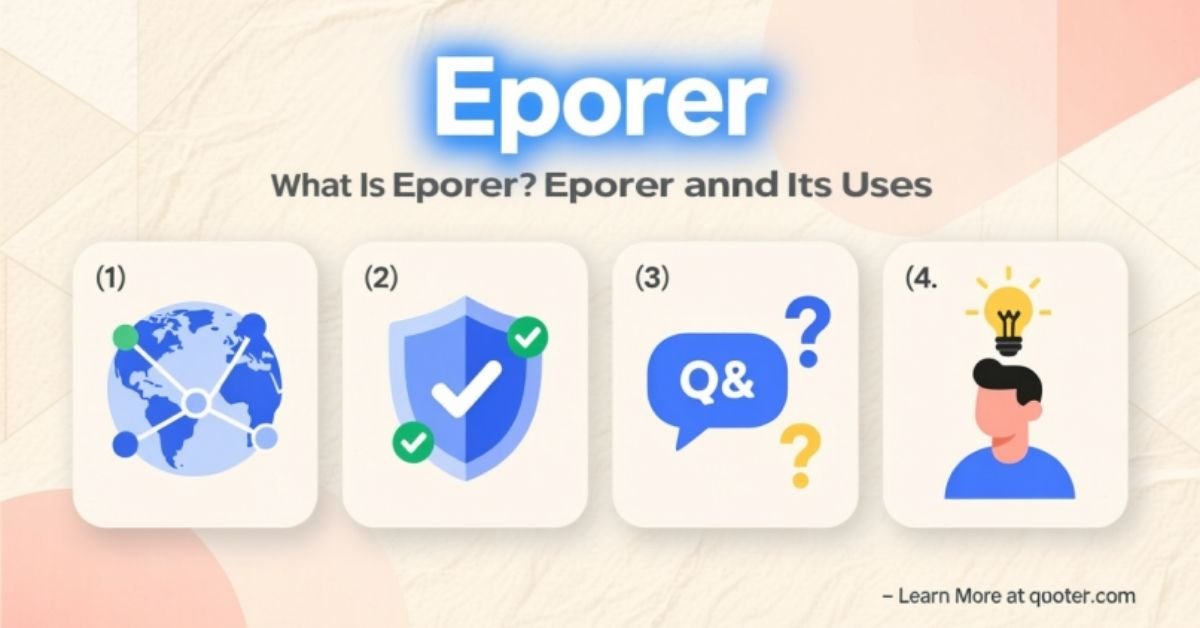The word “eporer” may sound unfamiliar at first glance, but it actually stems from a common linguistic root in several Romance languages—particularly French. In French, “épurer” (pronounced ay-pew-ray) means “to purify” or “to refine.” Over time, especially in informal or transliterated contexts, the term has occasionally appeared in English as “eporer,” though it’s not a standard English word. Despite this, many people searching for “eporer” are likely looking for information related to purification, refinement, or cleansing—whether in skincare, water treatment, or even digital data filtering. Understanding the concept behind eporer can help clarify its practical applications across various fields.
In essence, eporer refers to the act of removing impurities to achieve a cleaner, more effective, or higher-quality result. This idea is central to many industries, from cosmetics to environmental science. For example, in skincare, products labeled as “purifying” often aim to eporer the skin by drawing out dirt, oil, and toxins. Similarly, water filtration systems work on the principle of eporer—stripping away contaminants to deliver safe, clean drinking water. While the exact spelling “eporer” isn’t widely used in technical English documentation, the concept it represents is both relevant and widely applied.
Common Applications of the Eporer Concept
One of the most visible uses of the eporer principle is in personal care. Cleansers, face masks, and detox shampoos all promise to “purify” or “refine” by removing buildup without stripping essential moisture. These products often contain ingredients like charcoal, clay, or salicylic acid, which help draw out impurities from pores—effectively performing the action of eporer. In dietary supplements, detox teas or liver-support formulas also claim to eporer the body by aiding natural elimination processes.
Beyond personal wellness, the eporer concept plays a vital role in industrial and environmental contexts. Air purifiers, for instance, eporer indoor air by trapping dust, allergens, and volatile organic compounds. Likewise, wastewater treatment plants use physical, chemical, and biological methods to eporer sewage before releasing it back into ecosystems. Even in digital technology, data-cleaning algorithms “eporer” datasets by removing duplicates, errors, or irrelevant entries to improve accuracy and performance.
Benefits of Embracing the Eporer Approach
Adopting an eporer mindset—whether in lifestyle choices or technical processes—offers numerous advantages. Cleaner skin often means fewer breakouts and a healthier glow. Purified water reduces the risk of waterborne illnesses and improves taste. In manufacturing, refining raw materials through eporer-like methods enhances product quality and longevity. Moreover, mental clarity can also result from “eporing” your digital life—unsubscribing from unnecessary emails, organizing files, or limiting screen time to reduce cognitive clutter.
Below is a quick overview of how the eporer principle applies across different areas:
| Skincare | Deep-cleansing masks and exfoliants | Clearer, smoother skin |
| Water Treatment | Filtration and reverse osmosis | Safe, drinkable water |
| Air Quality | HEPA filters and ionizers | Reduced allergens and pollutants |
| Digital Data | Cleaning and deduplication tools | Improved system efficiency |
| Nutrition | Detox diets and fiber-rich foods | Better digestion and energy levels |
Safety and Considerations When Using Eporer Methods
While the idea of purification sounds universally positive, it’s important to apply eporer techniques wisely. Over-cleansing the skin, for example, can disrupt its natural barrier and lead to dryness or irritation. Similarly, extreme detox diets may deprive the body of essential nutrients if not properly balanced. Always choose gentle, science-backed methods that support—rather than overwhelm—your body’s natural systems. When it comes to home filtration or air purification, ensure devices meet safety and performance standards from recognized organizations.
Another consideration is sustainability. Some purification processes, like certain industrial filtration methods, can generate waste or consume significant energy. Opting for eco-friendly alternatives—such as reusable water filters or biodegradable skincare—aligns the eporer concept with environmental responsibility. Remember, true refinement isn’t just about removing what’s unwanted; it’s also about preserving what’s valuable.
How to Incorporate Eporer Into Daily Life
You don’t need expensive gadgets or drastic changes to benefit from the eporer philosophy. Start small: swap out a harsh face wash for a gentle purifying cleanser, install a basic water filter on your kitchen tap, or dedicate 10 minutes a day to organizing your digital workspace. Over time, these habits create a cumulative effect—leading to cleaner surroundings, clearer thinking, and improved well-being. The key is consistency, not intensity.
Think of eporer as a guiding principle rather than a rigid rule. It’s about intentionality—choosing what to keep and what to let go of, whether that’s physical clutter, emotional stress, or digital noise. By focusing on quality over quantity and purity over excess, you naturally align with the core spirit of eporer.
ALSO READ THIS POST: Qushvolpix: Revolutionizing Productivity with Smart Technology
Final Thoughts
Though “eporer” may not appear in your standard English dictionary, its meaning resonates deeply in today’s world—where clarity, cleanliness, and efficiency are highly valued. Whether you’re refining your skincare routine, improving your home’s air quality, or streamlining your workflow, you’re engaging with the timeless idea of purification. Understanding and applying the eporer concept thoughtfully can lead to meaningful improvements in both personal health and environmental impact.
Frequently Asked Questions (FAQs)
Is “eporer” a real English word?
No, “eporer” is not a standard English word—it’s a transliteration of the French verb “épurer,” meaning “to purify.”
Can eporer methods help with acne?
Yes, gentle purifying skincare that follows the eporer principle can reduce acne by clearing pores without over-drying.
Are home water filters effective at eporer tap water?
Most quality home filters effectively remove common contaminants like chlorine, lead, and sediment, aligning with eporer goals.
Does eporer apply to mental health practices?
Indirectly, yes—practices like digital detoxing or mindfulness “eporer” mental space by reducing distractions and stress.
Is there a difference between “detox” and “eporer”?
“Detox” usually refers to biological cleansing, while “eporer” is a broader concept of refinement or purification in any context.

